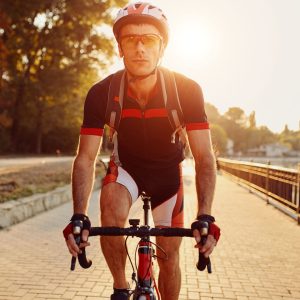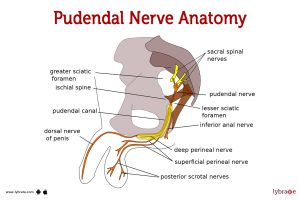
Cycling, a popular form of exercise and transportation, offers numerous health benefits. However, a lesser-known concern among cyclists is the potential risk of erectile dysfunction (ED) linked to prolonged and repetitive pressure on the pudendal nerve caused by the bicycle seat. The pudendal nerve, responsible for sexual function, can sustain trauma due to continuous compression, leading to various pelvic floor issues, including ED.

Repeatedly sitting on a narrow bicycle seat exerts pressure on the perineum and the pudendal canal, where the pudendal nerve resides. The constant compression may result in reduced blood flow and nerve damage in the genital region, impacting sexual function. The compression restricts blood flow to the penis, impairing the ability to achieve and maintain erections. Studies have shown that male cyclists who spend prolonged hours on their bikes are more likely to experience genital numbness, erectile difficulties, and even sexual dysfunction.
To mitigate the risk of pudendal nerve trauma and potential erectile issues, cyclists can employ various strategies:
- Proper Bike Fit: Ensuring the bike is appropriately fitted to the rider’s body can help distribute pressure more evenly and reduce excessive strain on the perineum.
- Seat Selection: Opting for wider, ergonomic, and padded seats can help alleviate pressure on sensitive areas, minimizing the risk of nerve damage.
- Padded Shorts: Wearing padded cycling shorts can provide additional cushioning and support, reducing direct pressure on the perineum.
- Taking Breaks: Regularly standing and adjusting position while cycling can alleviate prolonged pressure on the pudendal nerve.
In conjunction with seat modifications and posture adjustments, cyclists can explore additional strategies and treatments to mitigate existing issues or prevent pudendal nerve damage and associated sexual health concerns. These treatments, organic in nature and drug-free include the Priapus Shot (P-Shot), Autologous exosomes. shockwave therapy and vacuum therapy.
The Priapus Shot, commonly known as the P-Shot, involves the use of platelet-rich plasma (PRP) painlessly injected into specific areas to stimulate tissue regeneration and improve blood flow. This therapy aims to rejuvenate damaged nerves and tissues, potentially aiding cyclists experiencing ED due to pudendal nerve trauma. A minimum of 120 cc’s in the blood draw is essential and will yield the strongest, most effective PRP treatment.
Focused Shockwave therapy or Extracorporeal shock wave therapy (ESWT) utilizes acoustic waves to promote blood vessel growth and enhance blood flow to the affected area. This non-invasive treatment assists in repairing damaged tissues, nerves, vessels and improving erectile function by stimulating the body’s natural healing processes.
Vacuum therapy, involving the use of a vacuum pump erection device, creates negative pressure around the penis, encouraging blood flow and facilitating erections. It can be an adjunct therapy for cyclists seeking to improve erectile function affected by pudendal nerve compression. Use of the proper timings and pressure is essential.
Autologous exosomes represent an exciting innovative therapy gaining attention for its potential in treating various health concerns drug free, including addressing nerve damage and aiding in the regeneration of tissues. Often called, “next-generation PRP”, Exosomes are extracellular vesicles containing bioactive molecules like proteins, lipids, and genetic materials that play a crucial role in cell-to-cell communication and tissue repair.
In the context of cyclists experiencing erectile dysfunction (ED) due to pudendal nerve trauma, autologous exosome therapy holds promise as an adjunct treatment. These exosomes, harvested from the patient’s own cells (autologous), can be utilized to target damaged tissues, and support the body’s natural healing processes.
The administration of autologous exosomes involves isolating these potent cellular components from the patient’s adipose (fat) tissue or blood. Once extracted, these exosomes can be concentrated and then reintroduced into the affected area, aiming to promote tissue repair, reduce inflammation, and stimulate nerve regeneration.
By delivering a concentrated dose of bioactive molecules, including growth factors, and signaling proteins, autologous exosomes may assist in repairing damaged nerves and improving blood flow to the genital area. This therapy aims to enhance the body’s ability to regenerate tissues and potentially alleviate the impact of pudendal nerve trauma on sexual function.
In conjunction with other treatments such as the Priapus Shot (P-Shot), shockwave therapy, and vacuum therapy, autologous exosome therapy can be considered a complementary approach in addressing ED resulting from cycling-related pudendal nerve compression.
At Las Vegas Aesthetics, a concierge Medical Spa / Clinic located in Las Vegas, Nevada, we recognize the futuristic potential of autologous exosome therapy in assisting cyclists experiencing sexual health concerns due to nerve trauma from cycling. Our specialized treatments aim to harness the regenerative potential of exosomes, PRP, vacuum therapy and shockwave therapy to support tissue repair and improve erectile function.
For cyclists seeking comprehensive solutions to address nerve damage and sexual health issues, our experts offer personalized consultations, evaluating individual needs and recommending tailored treatment plans. Schedule a free consultation today to explore how we can assist you in optimizing your sexual wellness.702-664-1300
